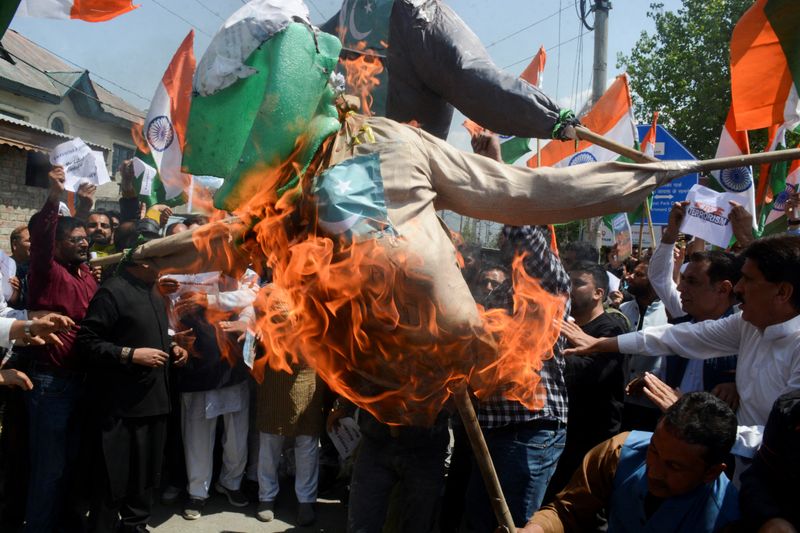By Fayaz Bukhari and Krishna N. Das
SRINAGAR (Reuters) – Images and videos of gunshots ringing out in a meadow, bloodied bodies lying on the ground, and people fleeing across a dry river bed have shattered Kashmir’s emergence as India’s new tourism hotspot.
The region’s strikingly beautiful mountains, valleys and grand Mughal-era gardens had drawn record tourist arrivals stemming from five years of relative safety. Supporters of Prime Minister Narendra Modi had touted the tourism boom as among his signature achievements.
But Tuesday’s attack by suspected militants who killed at least 26 tourists and wounded many more in Kashmir’s scenic Pahalgam area, known for its glowing Himalayan peaks and fast-flowing streams, has left panicked tourists seeking an early exit at the start of the busy summer season.
Modi, whose decision to strip Muslim-majority Kashmir’s partial autonomy in 2019 after decades of anti-India violence led to widespread protests, and his finance minister both cut short separate overseas trips after vowing justice.
He took a meeting of his top lieutenants at the airport itself upon return. Kashmir is divided between India and Pakistan, which both claim fully, and had been plagued by years of insurgent violence.
Locals have called for a one-day protest against the deadliest such attack in Kashmir in decades, tourist operators are reporting massive cancellations, and airlines are running additional return flights from Kashmir’s main city of Srinagar.
Tourism is the backbone of the Kashmir valley’s economy, and has been promoted heavily by the government and Indian airlines.
Arrivals hit a record high of more than 3 million last year, from fewer than 831,000 in 2018, as India’s widening middle class splurged on travel post-COVID, government data showed.
But some Kashmir hardliners have derided the influx as a cultural invasion by visitors from the rest of mostly Hindu India.
“We have a history of hospitality, but some cowardly terrorists want to destroy it all,” Sajjad Lone, a local lawmaker and chief of the Jammu and Kashmir People’s Conference party, told reporters.
“People involved in tourism have, after a long time, begun to restart their lives. They had begun to dream. Make no mistake, these terror attacks are aimed at yet again disempowering us economically.”
A little-known militant group, the “Kashmir Resistance,” claimed responsibility for the attack in a social media message. It said more than 85,000 “outsiders” had been settled in the region after arriving as tourists, vowing violence against such settlers. Civilian casualties, however, have fallen significantly in the past two decades, data shows.
Tourist operators, taxi drivers, and other people involved in the industry condemned the attack and rued lost business at the start of the summer rush. The attack is also a big blow to Modi’s attempts to draw foreign investments into the area.
As desperate tourists tried to flee Kashmir, flight tickets briefly rose sharply before the government met with airline operators and “issued a strong advisory against surge pricing”.
“In the aftermath of the incident in Pahalgam, there is an unexpected demand from tourists seeking to return to their homes,” the Ministry of Civil Aviation said in an advisory to all airlines. “Airlines are advised to take swift action to increase the number of flights.”
A top travel agent in Kashmir said on the condition of anonymity that they had to cancel about 90% of bookings for the next three months.
Shakir Ahmed, manager at a tourist taxi union in Pahalgam, said all their 30 vehicles were sitting idle as people fled in the morning.
“The streets are suddenly empty,” he said. “Summers are like wedding celebrations for us, but this year, we will have nothing. We are nothing without the tourists.”
Inaugurating a tunnel in January connecting a key snow hotspot in Kashmir with some other tourist sites, Modi said the federal territory of Jammu and Kashmir was benefiting from infrastructure and other work in recent years.
“Leaving behind the earlier difficult days, our Kashmir is now regaining its identity as a paradise on earth,” he said.
On Tuesday while on a visit to Saudi Arabia, he wrote on X: “Those behind this heinous act will be brought to justice … they will not be spared!”
(Reporting by Fayaz Bukhari in Srinagar and Krishna N. Das in New Delhi, additional reporting by Vijdan Mohammad Kawoosa, Rupam Jain and Abhijith Ganapavaram; Editing by Saad Sayeed)



